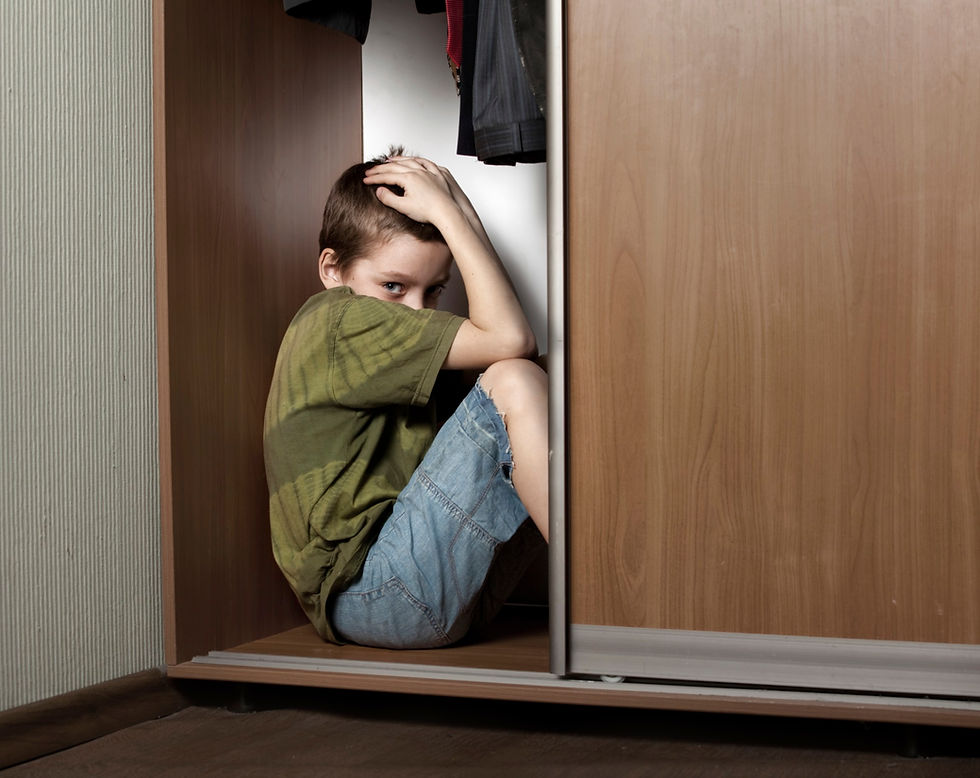Why Me?
- Carol Teitelbaum, MFT
- Mar 1, 2017
- 4 min read
Updated: May 5, 2018
Written by Carol Teitelbaum, MFT
Reprinted from THE SOBER WORLD
“YOU CAN ALWAYS HEAR THE LAUGHTER, SELDOM HEAR A TEAR FALL.” ~ KEITH JOHNSTONE
James, a six-year old boy, is sitting in his room wondering about the man that his mom is dating. Mom has been telling him all about Tom who she says is wonderful, kind and loving and has always wanted a little boy of his own. So far, Tom pays very little attention to him. Playing quietly in his room is what James does best since dad left. Mom cries all the time and he rarely sees her smile. He does not know how to make her happy so he just stays out of her way.
Tom decides it is time for the two of them to bond so he takes James fishing. James has never been on a boat before and has never gone fishing. Tom teaches him how to bait a hook, cast the line- and wait. While they wait for the fish to bite, Tom asks James lots of questions. He wants to know everything about him- his favorite food, favorite color, comic book, movie, and favorite songs. No one ever asked these questions before and it is pretty cool.
Mom smiles often now and James wants that to continue. Tom buys James gifts all the time and takes him to the movies, out to lunch and does all the cool things his friends do with their dads. When mom asks how he would feel if she married Tom, of course James said YES.
Now he is eight years old and life is good. He is doing well in school; he’s on the peewee baseball team and is very happy. One night, his life changed forever. Tom came in to tuck him in and rather than the normal mussing of his hair as he said goodnight, Tom inappropriately touched James. James froze, what is happening? This must be a mistake. Nothing is said at breakfast and Tom is acting normal, maybe that didn’t happen at all. A couple of nights later and for the next five years it happened again and again. James started taking long showers trying to wash away the dirty feeling. What is wrong with me, why is this happening to me?
How many little boys go through this scenario? Unfortunately, more than we would like to think. One in four boys will be sexually abused by the age of 18 and most abuse happens between the ages of 8 and 10.The perpetrators are not a group of strangers. We have been teaching our children to fear strangers for years. Studies show that is not the strangers we have to watch out for, over 93% of perpetrators are someone the child knows and trusts and many are family members. If someone who is supposed to be your caretaker, your protector, your champion abuses you, whom can you trust?
One of the most damaging effects of sexual abuse, as a child, is the loss of trust.
Children always blame themselves when something bad happens in the family. There is a reason for that. If it is the child’s fault, they feel they can do something about it. They can get older, smarter, more handsome, and help their parents get better. If they feel it is their parent’s fault and that there is something wrong with them, children know that there will be no one to take care of them. They have no money, no car, and no apartment to live in, what will happen to them?
I run two therapy groups a month for men who were abused as children. I watch each time a new man comes to the group for the first time as he hears the other men’s stories. They are so surprised and the same response comes out of them, “I had no idea, I thought I was the only one with these experiences and feelings.”
The enduring effect of childhood sexual abuse creates an easy road to the world of drugs and alcohol. For male survivors who are told to be “a real man” “you must be strong”, “never cry”, “don’t be vulnerable or ask for help”, “protect yourself” and then, as adults, ”be prepared to die for your country”, the thought of not measuring up to this criteria can make him feel shame. Shame because everyone will think he is not a real man.
When a young survivor is introduced to drugs or alcohol, they take it and guess what? The shame is gone. Do you think they will want to give that up? Unfortunately, the numbness they feel is only temporary, and once the drugs or alcohol wear off, the feeling all come back. Over 68 % of men in drug and alcohol recovery centers are sexual abuse survivors but few ever tell anyone. They leave treatment only to be triggered and relapse, creating a revolving door.
Education for our health and mental health professionals is paramount. After speaking about this subject for ten years, I am finding that so many people are uncomfortable with the subject of sex and very uncomfortable with the issues of sexual abuse, especially happening to boys. I am also finding that if the professional offers a safe, non-judgmental ear, many men will share their stories. Our organization offers two free group therapy sessions a month for male survivors and we find they are so relieved to find somewhere that they feel safe enough to share their story and get help.
Our organization also creates workshops for male patients in recovery facilities as well as training for the staff. We speak at conferences, schools and professional organizations.
An old Swedish saying, “A joy shared is doubled, a sorrow shared is halved.” We all want to be seen and heard. Be a compassionate listener. You may be the one person who saves a survivors life.
Carol Teitelbaum, LMFT is the co-founder of Creative Change Conferences. The 9th Annual It Happens to Boys Conference will be held in Austin, Texas on March 24, 2017. A premiere conference on the effects and healing of childhood sexual abuse for male survivors, their partners, parents, teachers, mental health professionals, health professionals and the recovery community. Together we can create a healing community. www.creativechangeconferences.com




Comments